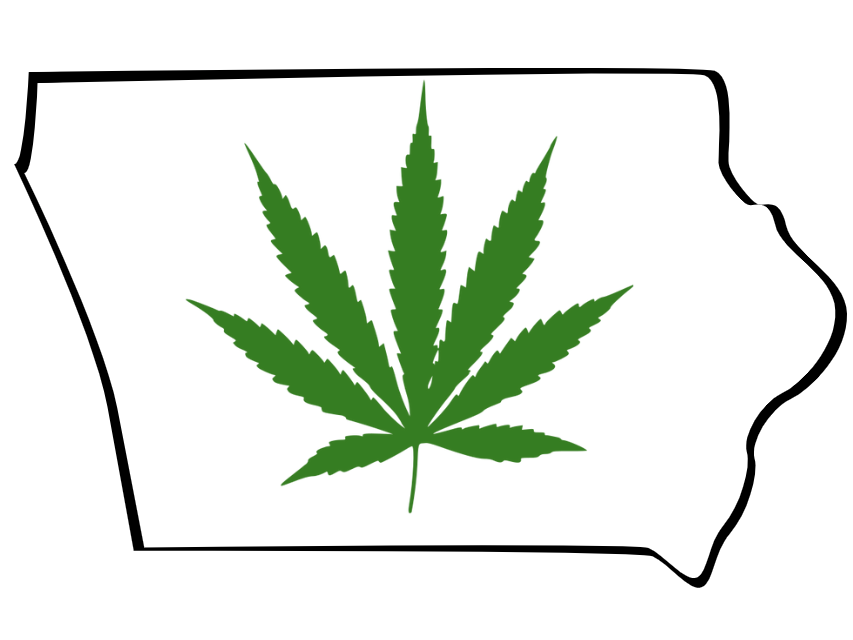In the last decade, the support for legalized marijuana has grown around the United States. With midterms, Iowa Democrats have broken their silence and voiced support for legalizing it statewide in hopes of gaining more support in the election.
As of October, 19 states as well as the District of Columbia and two other territories have fully decriminalized and legalized the use of marijuana.
There are only four states where any use of marijuana is still completely illegal and every other state is caught in a middle ground, Iowa being one of them.
The current status in Iowa is that CBD oil – a low-THC cannabidiol extract that does not cause a high – is legal only for medicinal purposes. Everything else is still a criminal offense.
“It’s not necessarily a question of if, but when it becomes legal,” said Aaron Khan-Gumm, a junior majoring in strategic political communications.
Khan-Gumm said that based on the current trends across the country he believes marijuana will be legal in a majority of states within the next decade.
“States can legalize things that are illegal on the federal level, it’s like a way for us to see what laws work and which don’t,” he said. “And the consensus is that legalizing marijuana has been really successful.”
Khan-Gumm pointed out both economic benefits and the undercutting of the black market. Legalizing it adds regulations similar to any food or medicine sold in the US. Activists say it will significantly cut down on the sale of laced or otherwise dangerous cannabis.
A study done at the University of Pittsburgh School of Health Sciences in July of 2021 revealed that states with legal recreational cannabis had almost an 8% reduction in opioid, laced and other overdose-related emergencies over a span of six months.
“You essentially bankrupt the black market. There’s no need to be a drug dealer if weed is legal,” Khan-Gumm said.
With the target demographic being that of the younger generations, many have wondered what life on campus would be like if marijuana were legalized.
“My intuitive thought is it would be dictated along the same lines as alcohol,” said Andrew Jackson, a senior studying law, politics and society, and philosophy. “I would then hope that being caught with it in your room would be lowered to that of a simple alcohol violation.”
Drake University is already a smoke free campus. Thus, any legal use of smoking cannabis would have to be away from university property. As for things like edibles, students believe they would fall under similar rules as alcohol already does.
With 19 states having legalized marijuana, Drake has many schools to look at when trying to model how they would react.
A pattern seen across many schools in the 19 states is still a complete ban on campus. According to federal law, federally funded institutions of higher education must enforce a complete ban due to marijuana still being illegal federally. Thus, institutions would lose any federal funding.
Likewise, students caught using it on campus (even if in a legal state) may lose their federal student aid.
Both Jackson and Khan-Gumm still believe reception across campus would be positive and there would be little to no push back.
“I think you would see a slight increase in use, but I don’t think it would be as big as people think,” Jackson said.
Jackson pointed to the fact that Drake is in a metropolitan area and that college students in general are notorious for high rates of usage of any substance.
“The legal barriers to getting and using marijuana are not necessarily effective in stopping people,” Jackson said. “It’s clear marijuana is pretty widespread on almost any college campus.”
Both Khan-Gumm and Jackson also agree that the best thing the university can do is offer usage education for harm reduction.
“There’s no point in trying to stop it,” Khan-Gumm said. “The best thing the university can do is teach people how to use it safely so no one gets hurt.”
Jackson is from Illinois, one of the 19 states where it is fully legalized and decriminalized.
“I haven’t noticed any difference in quality of life. However it is obviously safer to purchase and use it back home,” Jackson said.
Overall there is wide support, especially in the younger generations, to legalize marijuana across the United States.
Even with 54% of Iowans supporting legalization, according to the Des Moines Register, chances of legalization are still slim with current political polling showing Republicans may retain control of the legislature and governor’s office.
It may still be a few years for Iowa before the Democrats can push any legislation further through.







